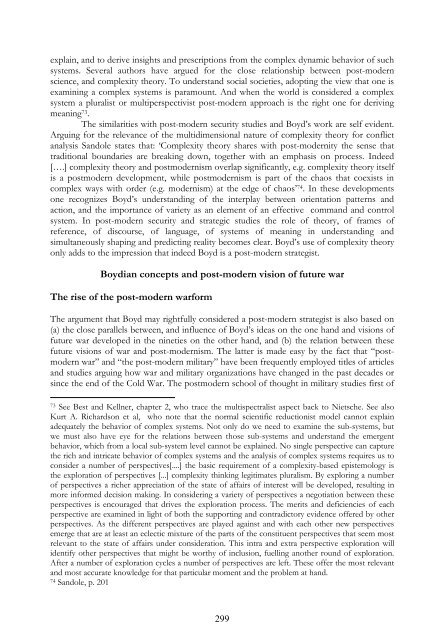Science, Strategy and War The Strategic Theory of ... - Boekje Pienter
Science, Strategy and War The Strategic Theory of ... - Boekje Pienter
Science, Strategy and War The Strategic Theory of ... - Boekje Pienter
Create successful ePaper yourself
Turn your PDF publications into a flip-book with our unique Google optimized e-Paper software.
explain, <strong>and</strong> to derive insights <strong>and</strong> prescriptions from the complex dynamic behavior <strong>of</strong> suchsystems. Several authors have argued for the close relationship between post-modernscience, <strong>and</strong> complexity theory. To underst<strong>and</strong> social societies, adopting the view that one isexamining a complex systems is paramount. And when the world is considered a complexsystem a pluralist or multiperspectivist post-modern approach is the right one for derivingmeaning 73 .<strong>The</strong> similarities with post-modern security studies <strong>and</strong> Boyd’s work are self evident.Arguing for the relevance <strong>of</strong> the multidimensional nature <strong>of</strong> complexity theory for conflictanalysis S<strong>and</strong>ole states that: ‘Complexity theory shares with post-modernity the sense thattraditional boundaries are breaking down, together with an emphasis on process. Indeed[….] complexity theory <strong>and</strong> postmodernism overlap significantly, e.g. complexity theory itselfis a postmodern development, while postmodernism is part <strong>of</strong> the chaos that coexists incomplex ways with order (e.g. modernism) at the edge <strong>of</strong> chaos’ 74 . In these developmentsone recognizes Boyd’s underst<strong>and</strong>ing <strong>of</strong> the interplay between orientation patterns <strong>and</strong>action, <strong>and</strong> the importance <strong>of</strong> variety as an element <strong>of</strong> an effective comm<strong>and</strong> <strong>and</strong> controlsystem. In post-modern security <strong>and</strong> strategic studies the role <strong>of</strong> theory, <strong>of</strong> frames <strong>of</strong>reference, <strong>of</strong> discourse, <strong>of</strong> language, <strong>of</strong> systems <strong>of</strong> meaning in underst<strong>and</strong>ing <strong>and</strong>simultaneously shaping <strong>and</strong> predicting reality becomes clear. Boyd’s use <strong>of</strong> complexity theoryonly adds to the impression that indeed Boyd is a post-modern strategist.Boydian concepts <strong>and</strong> post-modern vision <strong>of</strong> future war<strong>The</strong> rise <strong>of</strong> the post-modern warform<strong>The</strong> argument that Boyd may rightfully considered a post-modern strategist is also based on(a) the close parallels between, <strong>and</strong> influence <strong>of</strong> Boyd’s ideas on the one h<strong>and</strong> <strong>and</strong> visions <strong>of</strong>future war developed in the nineties on the other h<strong>and</strong>, <strong>and</strong> (b) the relation between thesefuture visions <strong>of</strong> war <strong>and</strong> post-modernism. <strong>The</strong> latter is made easy by the fact that “postmodernwar” <strong>and</strong> “the post-modern military” have been frequently employed titles <strong>of</strong> articles<strong>and</strong> studies arguing how war <strong>and</strong> military organizations have changed in the past decades orsince the end <strong>of</strong> the Cold <strong>War</strong>. <strong>The</strong> postmodern school <strong>of</strong> thought in military studies first <strong>of</strong>73 See Best <strong>and</strong> Kellner, chapter 2, who trace the multispectralist aspect back to Nietsche. See alsoKurt A. Richardson et al, who note that the normal scientific reductionist model cannot explainadequately the behavior <strong>of</strong> complex systems. Not only do we need to examine the sub-systems, butwe must also have eye for the relations between those sub-systems <strong>and</strong> underst<strong>and</strong> the emergentbehavior, which from a local sub-system level cannot be explained. No single perspective can capturethe rich <strong>and</strong> intricate behavior <strong>of</strong> complex systems <strong>and</strong> the analysis <strong>of</strong> complex systems requires us toconsider a number <strong>of</strong> perspectives[....] the basic requirement <strong>of</strong> a complexity-based epistemology isthe exploration <strong>of</strong> perspectives [...] complexity thinking legitimates pluralism. By exploring a number<strong>of</strong> perspectives a richer appreciation <strong>of</strong> the state <strong>of</strong> affairs <strong>of</strong> interest will be developed, resulting inmore informed decision making. In considering a variety <strong>of</strong> perspectives a negotiation between theseperspectives is encouraged that drives the exploration process. <strong>The</strong> merits <strong>and</strong> deficiencies <strong>of</strong> eachperspective are examined in light <strong>of</strong> both the supporting <strong>and</strong> contradictory evidence <strong>of</strong>fered by otherperspectives. As the different perspectives are played against <strong>and</strong> with each other new perspectivesemerge that are at least an eclectic mixture <strong>of</strong> the parts <strong>of</strong> the constituent perspectives that seem mostrelevant to the state <strong>of</strong> affairs under consideration. This intra <strong>and</strong> extra perspective exploration willidentify other perspectives that might be worthy <strong>of</strong> inclusion, fuelling another round <strong>of</strong> exploration.After a number <strong>of</strong> exploration cycles a number <strong>of</strong> perspectives are left. <strong>The</strong>se <strong>of</strong>fer the most relevant<strong>and</strong> most accurate knowledge for that particular moment <strong>and</strong> the problem at h<strong>and</strong>.74 S<strong>and</strong>ole, p. 201299
















